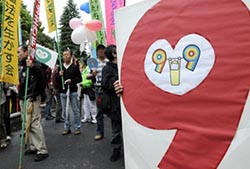ARTICLE 9 NOMINATED FOR NOBEL PEACE PRIZE
 As the current administration is accelerating its efforts to reinterpret Japan’s peace constitution to loosen its restraints on the use of force, a number of important initiatives are seeking to highlight the important role Article 9 plays as a peace ideal. Among them, notably, the successful efforts to have the war-renouncing clause nominated for this year’s Nobel Peace Prize.
As the current administration is accelerating its efforts to reinterpret Japan’s peace constitution to loosen its restraints on the use of force, a number of important initiatives are seeking to highlight the important role Article 9 plays as a peace ideal. Among them, notably, the successful efforts to have the war-renouncing clause nominated for this year’s Nobel Peace Prize.
One prominent initiative came from Japan’s civil society. In January 2013, Japanese citizen Takasu Naomi, who describes herself as a homemaker, initiated a call to nominate Article 9.
Initially ignored by Japanese news media and the Nobel committee, the initiative gained traction after Takasu managed to receive the support of over 1500 people in only five days through a signature campaign. The committee then replied and explained that only individuals and organizations– not a constitution – were eligible to run for the prize, and that only certain kind of people – not housewives – were entitled to make a nomination.
So in August 2013, the Executive Committee for the Nobel Peace Prize for Article 9 of the Japanese Constitution was set up and decided that “the Japanese people, who have abided by Article 9 and have not waged war in nearly 70 years”, instead of Article 9 itself, would be the candidate. It also identified 43 people qualified to submit letters of nomination to the Nobel committee, along with close to 25,000 signatures of support.
On April 9, 2014, the committee announced that, this time, it accepted the nomination. The laureate for this year’s prize will be announced on October 10.
On May 22, in a separate initiative, a group of 60 politicians representing seven political parties (including two parliamentarians from the ruling Liberal Democratic Party), handed a similar recommendation to the Nobel Committee. “The Japanese Constitution is the ideal the world should aim for,” said one of the petition’s initiators and Democratic Party of Japan lawmaker Konishi Hiroyuki.
Although it is rather unlikely that Article 9 will win the Nobel Peace Prize, its nomination is in itself a symbolic victory, as it sends a powerful message that has allowed raising global awareness about the role Article 9 has played in Japan and for the region.
If the initiative were to turn out successful, the Prize would ironically be received on the country’s behalf by Prime Minister Abe Shinzo himself, the very figure who has pushed for its revision. It would also have a strong impact on his administration’s efforts to reinterpret it.
Growing voice opposing Abe’s moves against Article 9
These high profile initiatives are part of a growing number of groups forming and consolidating in opposition to the government’s push to revise the country’s peace constitution.
According to Japanese news agency Kyodo, more than 7,000 groups have come together across Japan to call for the preservation of Article 9, especially over the past few months. These groups represent a wide range of constituencies, from inter-religious coalitions to concerned scholars, constitutional law and foreign policy experts, local municipal assemblies and women’s groups.
Polls continue to show that a majority of the Japanese people wants the country to adhere to the ideals of its pacifist Constitution. According to an Asahi Shimbun survey carried in May, 55% of respondents oppose the administration’s plan to reinterpret Article 9 to allow the exercise of the right to collective self-defense, against 29% who support it. Asked about Abe’s method of bypassing the due process of approval by the Diet and through a national referendum, 67% find it “improper”, against just 18% that approve it.
It remains to be seen how these growing movement will influence the political debate. Join your voice by signing the international petition to save Japan’s peace constitution here!
Picture credit: AFP